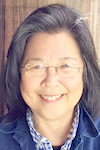
Nancy Ukai
We’re all guilty of having gone down the rabbit hole of the internet, but have you gotten lost in the digital archives of the Pacific Citizen?
All of the JACL’s newspapers are digitized and available for free on the P.C.’s website under “Newspaper Archives,” starting with the inaugural issue in October 1929. (See https://www.pacificcitizen.org/newspaper-archives/.)
Prewar news accounts make for sobering yet compelling reading. An article in November 1941 titled “’42 Production Plans” alerts readers that “the cooperation of every Japanese farmer has been requested for the Defense Program of 1942, which calls for the largest production in the history of American agriculture.”
One month later, Pearl Harbor was attacked, and within half a year, Japanese American farmers were losing uncounted millions of dollars in crops and generational wealth in land.
Details deepen one’s understanding of the humiliations and erasures. A June 1942 report titled “It Happened in May …” records the Japanese Tea Garden’s closure after three decades of serving as a San Francisco landmark. Five members of the Hagiwara family were “evacuated.” A proposal to turn it into a “super deluxe hamburger stand” did not materialize.
A baseball game between Placer Junior College and Placer Union High School in California was canceled because 150 Nisei students were forced to leave school.
Nikkei history was a perennial topic in the P.C. In a correction letter (April 1941), Paul Parker of Berkeley wrote that the first Japanese settlers did not come to Monterey in 1897, as was stated in an earlier P.C. issue, but 20 years earlier. Cattle buyer D. W. Jones “had taken a band of sheep to Japan in 1872, and they did so well under his guidance that he came back five years later” with three Japanese: Okee, Kada and Hasegawa “to make further purchases.”
Carol Kawase, president of the NCWNP district, uses the archives to research the history of chapters. I noticed that in the April 1941 issue, my uncle, Tetsuo Takayanagi of Berkeley, was a member of the Oakland chapter. After release from Topaz, he entered the MIS and later moved to Massachusetts, never to return to California (but he subsequently joined the Boston chapter).
The P.C. archives even help PhD candidates do research. Jonathan Van Harmelen recently was awarded a doctorate in history at the University of California, Santa Cruz. His dissertation is about the relations of the U.S. Congress and Japanese American lobbyists leading up to and during World War II.
He said in an email, “I used the P.C. archives for research because the JACL did an excellent job of cataloging all the hate speech in Congress as part of their effort to mobilize support for their lobbying campaigns.”
“At the same time,” Van Harmelen said, “it displayed cold indifference toward No-Nos in Tule Lake for being unpatriotic and mocked renunciants for leaving the U.S. for Japan. As I argue, Congress pushed the government to punish Tule Lake inmates for insubordination, and as a consequence, many JACL supporters distanced themselves from the events in Tule Lake.”
“The P.C. back issues are a gold mine for commentary and discourse about politics and elections and how it affected Japanese Americans in the 1940s,” he concluded.
Van Harmelen also used the P.C. to write two articles for the Japanese American National Museum’s “Discover Nikkei” series about Teiko Ishida, the first woman appointed to the JACL’s National Board in 1939. During the war, she wrote a column in the P.C. titled “Calling All Chapters.”
According to P.C. Executive Editor Allison Haramoto, a photographic archive will soon be made available to the public. In our visual world, such images will help future storytelling about Japanese American history.
Please join me in supporting the Pacific Citizen by contributing to its Spring Campaign so that staff can continue their efforts to make archival material available and accessible to all, from casual readers to the scholarly community.
Nancy Ukai is a member of the Pacific Citizen Editorial Board Member representing the NCWNP.



